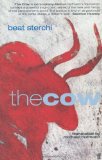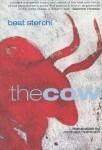 Translated from the German by Michael Hofmann
Translated from the German by Michael Hofmann
Five words from the blurb: cow, relationship, man, abattoir, village
I was drawn towards The Cow because it is set in a small Swiss farming village at a time when Swiss mountain dogs were used to herd cattle and pull milk carts. As the owner of a Bernese mountain dog I was keen to learn more about their working life on the alpine slopes and was rewarded with some wonderful scenes of dogs working with cattle.
The book begins with Ambrosio, a Spanish man, arriving in the Swiss highlands in order to work for farmer Knuchel. The rest of the local farms are busy installing milking machines, but Knuchel is determined to avoid modernisation and stick to traditional methods. The book captured the time when life on these farms changed and by alternating modern scenes with ones from the past it was possible to see exactly what has been lost.
All the cows are named and some scenes are written from their perspective. It was unusual, but it worked really well and I came to know the cows; understanding their personalities and feeling their fears.
The only real negative was that this book contains horrific scenes from an abattoir and I have to admit that some sections were too disturbing for me. This is an example from the start of a scene – I think you can imagine how it progresses to become deeply disturbing:
The cow lifts her head. All wobbles and trembles: she pulls her weight on to her front feet. She’s trying to get up.
With nostrils dripping red, she trumpets through the slaughterhouse. She sits there and rolls her head round to the right, the left, the right again. I retreat……I close my eyes, with my back to the wall, I slip down into a crouch, and try not to think any more.
These scenes had more impact because they were surrounded by tranquil images of the cows enjoying life on the Alpine pastures, each with their own individual cow bell. Some of the abattoir descriptions were necessary to convey the issues, but there were too many for my taste.
Some reviews have suggested that this book will turn the reader into a vegetarian, but I found it simply encouraged the responsible sourcing of meat. Modern mass production of food is displayed in all its ugly glory and this book left me craving a time when all the animals were known as individuals, treated with love and respect, and never knew fear.
This is a disturbing book, but it carries an important message. Recommended to those with a strong stomach.

…
For more German language recommendations take a look at German literature month organised by Lizzy and Caroline.
